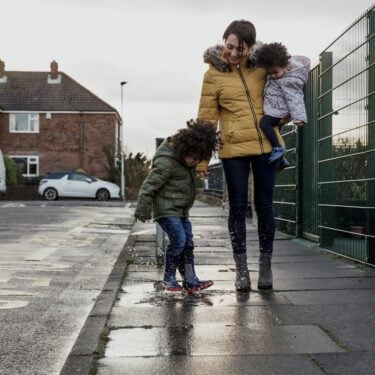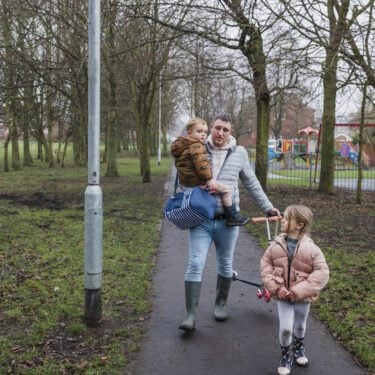Fathers who are actively involved in bringing up their young children are more likely to keep in regular contact with their child, in the event of a split from their partner.
Meanwhile mothers who separate from their child’s father have a poorer view of their abilities as a parent than those who stay in their relationship.
These are two of the key findings from a project funded by the Nuffield Foundation on parenting, which examines these questions for the first time in the UK.
Professor Lucinda Platt from the London School of Economics and Political Science (LSE) and Dr Tina Haux from the University of Kent wanted to see if more involved, active dads who are close to their child when they are very young are likely to see their son or daughter more in the event of a separation. They also looked at what other pre-separation factors were at play in the amount of contact after a split, such as the length of time since separation and the age of the child.
The second strand of the research focused on whether separation knocks a mother’s confidence as a parent and, if so, how quickly she recovers.
Explaining the background to the research, Dr Haux said: “With high rates of separation in the UK, there has been a lot of interest in the negative effects a split has on any children involved. Policy makers have been keen to encourage meaningful contact between non resident parents (mostly fathers) and their children. The effect of a separation on a mother’s parenting capacity has also become an area of concern.”
The researchers made use of the Millennium Cohort Study (MCS), a UK-wide cohort study of around 19,000 children born to families resident in the UK between September 2000 and January 2002. Focusing on families where there had been a separation and where the mother remained the main carer, they looked at data from around 2,800 families who had experienced separation across the survey period.
Around eight out of ten dads who were separated by the time their child was 3 had at least some contact with their child over that period. That increased to nine out of ten fathers who separated when their child was older. However, when the researchers looked at the impact of passing time, among those children whose parents had separated by age 3, three in 10 had lost all contact with their dad by the time they were 11 years old.
A quarter of fathers of 3 year-olds saw them multiple times during the week, whereas around one in five saw their child occasionally, but less often than every week.
Seventy three per cent of fathers separated by the time their child was aged 5 had their son or daughter stay overnight at least occasionally. This figure rose to more than 80 per cent of fathers who were newly separated when the child was 11 years old. And half of them had the child to stay overnight ‘often’.
Being a more involved dad (changing nappies, putting the child to bed, reading and playing with them) prior to separation didn’t make any difference to whether or not contact was maintained, but it was linked to more frequent contact and increased overnight stays, particularly where the father had looked after the child by himself.
The younger the child and the greater the amount of time that had passed since separation, the greater likelihood there was of no contact taking place. This was regardless of how involved a parent the father was prior to separation.
Fathers were just as likely to lose contact with a boy as a girl, but boys tended to have more frequent contact with their dads and stay overnight more regularly. Better off fathers were more likely to stay in contact with their child and have them to stay over more regularly, highlighting the importance of having the financial means to provide a bedroom for the child, for example.
Dr Haux commented: “Our research shows that the more closely involved a dad is in the upbringing of his young child, the more likely he is to have regular contact in the event of a separation and that the sorts of activities a dad is involved with in the early years matter. For policy, paternity leave policies may have payoffs in terms of subsequent contact, whilst support for a father to meet more regularly with his child and provide a bedroom for them could also be important.”
There were no significant differences in a mother’s initial evaluation of her parenting abilities whether she went on to separate from her partner or not. Once mothers did separate, however, their evaluation of their abilities to be a good parent went down compared with their counterparts who remained in a relationship.
Professor Platt commented: “It became apparent to us very quickly that it was not less confident parents who went on to separate. Instead, there was a clear link between separation and a knock to a mother’s confidence in her abilities as a parent.”
Digging deeper, the researchers found that the impact of separation seemed to occur through mothers having higher risks of maternal depression following a split and their children experiencing slightly more behavioural problems.
However, whilst other research has tended to show a recovery with the passing of time in a mother’s mental health, for example, this research showed no recovery in parenting confidence over time. Mothers who had been separated for longer did not tend to have higher confidence in their parenting competence compared to mothers who had been separated more recently.
Whether the father was still in contact with the child after a split did not make any difference to the way in which a mother evaluated her parenting competence.
Professor Platt added: “So for mothers, we learn that a separation tends to lead to them thinking of themselves as a poorer parent, although it is difficult to disentangle this from an increased risk of mental health problems and the challenges of a child’s behavioural difficulties. We can conclude that being a single mum is inherently tough and that those trying to support this group of women should recognise that a focus on mental health alone may not be enough to help them get back on their feet and provide a happy, healthy home for their child. Practical, as well as psychological, support around parenting is likely to be key.”
ENDS
Contact details
Tina Haux – T.Haux@kent.ac.uk
Lucinda Platt – L.Platt@lse.ac.uk
Acknowledgements
The researchers would like to thank their co-author Rachel Rosenberg for her meticulous work in preparing the data.
The research project made use of surveys 1-5 of the Millennium Cohort Study (www.cls.ioe.ac.uk/mcs) and was accessed from the UK Data Archive. The research team are grateful to The Centre for Longitudinal Studies at UCL Institute of Education for the use of these data and to the UK Data Archive and Economic and Social Data Service for making the MCS data available. However, Centre bears no responsibility for the analysis or interpretation of these data.
The Nuffield Foundation has funded this project, but the views expressed are those of the authors and not necessarily those of the Foundation.





















































